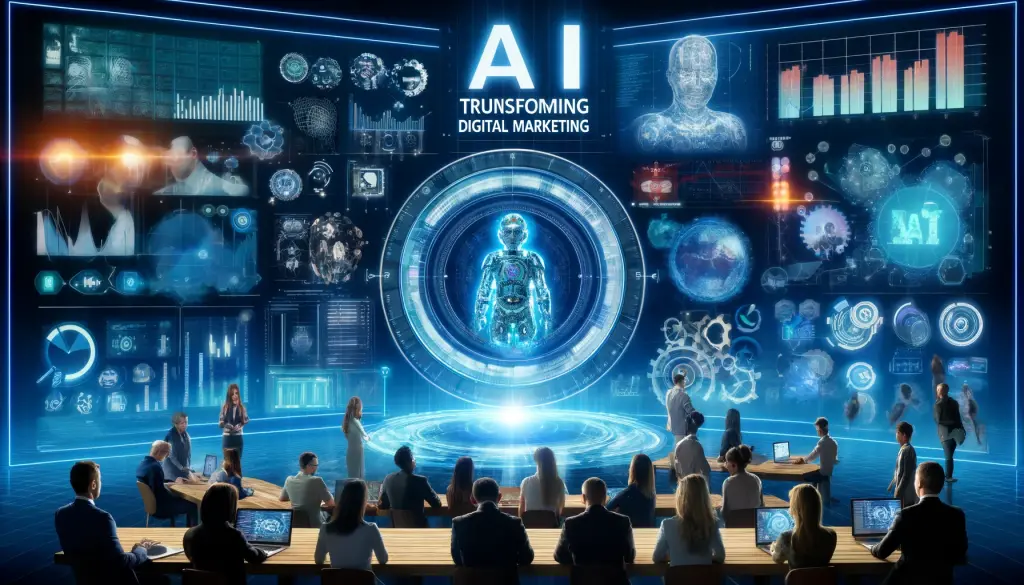The landscape of digital marketing is constantly evolving, shaped by technological advancements, changing consumer behaviors, and the increasing availability of data. In recent years, one of the most significant catalysts for change has been the rise of Artificial Intelligence (AI). AI’s integration into digital marketing strategies is transforming how businesses engage with customers, analyze data, and optimize campaigns, leading to more effective and personalized marketing efforts.
AI, with its ability to process vast amounts of data at incredible speeds, offers unprecedented insights and automation capabilities. This revolutionizes the foundational aspects of digital marketing, from customer segmentation and targeting to content creation and campaign management. The implementation of machine learning algorithms, natural language processing, and predictive analytics allows for a more nuanced understanding of consumer behavior, enabling marketers to craft strategies that are not only data-driven but also highly tailored to individual preferences and needs.
The transformative impact of AI in digital marketing is evident in the way businesses can now anticipate customer needs, personalize interactions, and streamline decision-making processes. This has led to a shift from traditional, broad-spectrum marketing approaches to more dynamic, real-time, and personalized strategies. The integration of AI tools has enabled marketers to deliver content and offers that resonate with the individual at the right time and through the preferred channels, enhancing customer experiences and increasing the efficiency and effectiveness of marketing campaigns.
In this article, we will explore how AI is reshaping the digital marketing landscape, highlighting the key areas of integration, the benefits it brings to marketing strategies, and the challenges and future trends associated with AI-driven marketing. The goal is to provide a comprehensive understanding of the profound impact AI is having on digital marketing and how businesses can leverage these advancements to stay ahead in the competitive market.
The Integration of AI in Digital Marketing
Artificial Intelligence (AI) technologies such as machine learning, natural language processing (NLP), and predictive analytics are increasingly becoming integral components of digital marketing strategies. Their integration is reshaping the marketing landscape, providing innovative ways to enhance data analysis, decision-making processes, and customer experiences.
Integration of AI Technologies in Digital Marketing
- Machine Learning:
- Personalization at Scale: Machine learning algorithms analyze customer data and behavior to create personalized experiences for each user, from product recommendations to tailored content in emails and on websites.
- Customer Journey Optimization: By predicting customer actions and preferences, machine learning helps in mapping out more effective customer journeys, optimizing touchpoints for engagement and conversion.
- Natural Language Processing (NLP):
- Content Creation and Curation: NLP enables the automated generation of content, such as news articles, product descriptions, and marketing copy, tailored to the audience’s interests and needs.
- Sentiment Analysis: Analyzing customer feedback, reviews, and social media conversations with NLP provides insights into public sentiment about products, services, and brands, guiding marketing strategies and communications.
- Predictive Analytics:
- Forecasting Trends and Behaviors: Utilizing historical data and AI algorithms, predictive analytics can forecast market trends, customer behavior, and the potential success of marketing campaigns.
- Data-Driven Decision Making: This approach supports more strategic planning and real-time decision-making in marketing campaigns, budget allocation, and resource management.
Benefits of AI in Enhancing Data Analysis, Decision-Making, and Customer Experiences
- Enhanced Data Analysis:
- AI’s ability to process and analyze vast datasets rapidly outperforms manual analysis, uncovering hidden patterns, trends, and insights that can inform and guide marketing strategies.
- Improved Decision-Making:
- AI-driven analytics provide actionable intelligence, enabling marketers to make informed decisions quickly and efficiently. This reduces guesswork and enhances the strategic alignment of marketing efforts with business goals.
- Elevated Customer Experiences:
- By understanding customer preferences, behaviors, and feedback through AI, businesses can deliver highly personalized and relevant experiences. This not only increases customer satisfaction but also fosters loyalty and enhances brand reputation.
- Operational Efficiency:
- AI automates routine and complex tasks in marketing processes, from data collection and analysis to campaign monitoring and optimization, freeing human resources for strategic thinking and creative tasks.
- ROI Optimization:
- With AI, marketing campaigns can be continuously monitored and optimized for performance, ensuring the best use of budgets and maximizing return on investment.
The integration of AI in digital marketing signifies a shift towards more intelligent, efficient, and customer-centric marketing practices. By leveraging machine learning, NLP, and predictive analytics, businesses can not only enhance their marketing efforts but also achieve a competitive edge in the increasingly digital marketplace.
AI-Driven Customer Segmentation and Targeting
Artificial Intelligence (AI) has revolutionized customer segmentation and targeting in digital marketing, enabling businesses to analyze customer data more deeply and accurately. This advanced analysis facilitates the creation of highly detailed and nuanced customer segments, leading to more personalized and effective marketing strategies.
The Role of AI in Analyzing Customer Data
- Detailed Segmentation:
- AI algorithms can sift through extensive datasets to identify patterns and characteristics that define different customer groups. This segmentation goes beyond basic demographic information, incorporating behaviors, preferences, and engagement histories to create a multifaceted view of the customer base.
- Dynamic Segmentation:
- Unlike static segmentation methods, AI-driven segmentation is dynamic, constantly evolving based on real-time data. This adaptability ensures that customer segments remain relevant and reflective of current behaviors and trends.
- Predictive Insights:
- AI not only analyzes past and present customer data but also predicts future behaviors and preferences. This predictive capability allows marketers to anticipate customer needs and tailor their strategies accordingly.
How AI Enables Personalized Targeting
- Customized Content and Offers:
- Based on the detailed segments created by AI, marketers can craft highly customized content and offers that resonate with each specific group or individual, enhancing the personalization of marketing efforts.
- Optimized Channel Strategy:
- AI helps determine the most effective communication channels for each customer segment, optimizing the delivery of marketing messages. For example, some segments may respond better to email campaigns, while others prefer social media or mobile app notifications.
- Behavioral Targeting:
- By understanding the subtle nuances in customer behavior, AI enables behavioral targeting, where marketing actions are tailored not just to who the customers are, but also to how they interact with the brand across different touchpoints.
- Enhanced Customer Journeys:
- Personalized targeting with AI leads to more relevant and engaging customer journeys. Each touchpoint is optimized to cater to the individual’s interests and needs, improving the overall customer experience and increasing the likelihood of conversion.
- Continuous Learning and Improvement:
- AI systems continuously learn from ongoing interactions and feedback, refining customer segmentation and targeting over time. This ongoing learning process ensures that marketing strategies remain effective and evolve with changing customer dynamics.
AI-driven customer segmentation and targeting represent a significant advancement in digital marketing, offering unprecedented precision and effectiveness. By leveraging AI to understand and cater to the specific needs and behaviors of different customer segments, businesses can achieve a higher degree of personalization in their marketing campaigns, leading to improved customer satisfaction, loyalty, and return on investment.
Personalized Advertising and Content Creation
Artificial Intelligence (AI) is transforming the realm of digital marketing by enabling personalized advertising and automating content creation. Through AI, businesses can tailor advertising messages and content to match individual preferences and behaviors, enhancing engagement and effectiveness.
Tailoring Advertising Messages and Content
- Data-Driven Personalization:
- AI analyzes customer data, including browsing history, purchase patterns, and social media activity, to understand individual preferences and behaviors. This deep insight allows marketers to craft personalized advertising messages and content that resonate with each customer.
- Dynamic Content Customization:
- AI-driven platforms can dynamically alter the content of ads and marketing materials in real-time to match the interests of the viewer. This includes changing visuals, text, and calls-to-action to align with the user’s profile and likely interests.
- Contextual and Behavioral Targeting:
- AI helps in contextual and behavioral targeting by placing ads in the most relevant online environments and timing them according to the user’s habits, ensuring that the ads are seen in the right context and at the right moment.
AI Tools for Automating Content Creation
- Natural Language Generation (NLG) Tools:
- NLG tools like OpenAI’s GPT-3 can generate human-like text, aiding in the creation of product descriptions, blog posts, and ad copy that are tailored to specific audience segments.
- Using GPT-3 or similar tools, marketers can input basic product data and receive detailed, creatively written product descriptions that are optimized for SEO and customer engagement.
- Automated Content Curation and Assembly:
- AI systems can curate content from various sources and assemble it into coherent articles, newsletters, or social media posts, ensuring a steady stream of relevant content for different audience segments.
- A fashion e-commerce platform using AI to curate and assemble trend reports and styling tips based on the latest industry data and consumer behavior analysis.
- Creative Ad Generation:
- AI tools can generate creative elements for ads, including headlines, images, and videos, that are optimized for conversion and engagement.
- Platforms like Persado or AdGen use AI to create and test multiple variations of ad copy and imagery to determine which combinations perform best with different audience groups.
- Predictive Content Performance:
- Some AI tools predict the potential performance of content even before it is published, allowing marketers to fine-tune messages and strategies to maximize impact.
- Tools that analyze historical data and current market trends to predict how well a particular piece of content or ad campaign will resonate with the target audience.
By leveraging AI for personalized advertising and content creation, businesses can not only save time and resources but also significantly improve the relevance and effectiveness of their marketing efforts. This tailored approach leads to better customer experiences, higher engagement rates, and ultimately, increased conversion and loyalty.
Campaign Optimization and Performance Analysis
Artificial Intelligence (AI) plays a crucial role in the optimization and performance analysis of marketing campaigns, enhancing the ability of businesses to achieve better return on investment (ROI) and make informed, data-driven decisions.
Real-Time Campaign Monitoring and Optimization
- Continuous Performance Tracking:
- AI-powered tools continuously monitor campaign performance across various channels, collecting data on user interactions, engagement rates, conversion metrics, and more. This real-time monitoring enables marketers to quickly identify trends and anomalies.
- Dynamic Optimization:
- Based on the collected data, AI algorithms can dynamically adjust campaign parameters such as bidding strategies, ad placements, and audience targeting to optimize performance. This means campaigns can be fine-tuned in real-time, maximizing the efficiency of marketing spend.
- A/B Testing and Experimentation:
- AI facilitates advanced A/B testing and multivariate experiments, automating the process of testing different versions of campaign elements to determine which variations deliver the best results. AI can then scale the winning strategies automatically.
Utilizing AI for Predictive Analytics
- Forecasting Campaign Outcomes:
- AI employs predictive analytics to forecast the outcomes of marketing campaigns based on historical data and current performance trends. This predictive capability helps marketers anticipate the future success of campaigns, guiding strategic planning.
- Data-Driven Adjustments:
- By analyzing predictive insights, businesses can proactively make adjustments to their marketing strategies, such as reallocating budgets, modifying content, or shifting focus to more promising channels or audience segments.
- Customer Lifetime Value Prediction:
- AI algorithms can predict the lifetime value of customers based on their engagement and purchasing behaviors, helping marketers to tailor campaigns to retain high-value customers and optimize long-term revenue.
Examples of AI in Campaign Optimization and Performance Analysis
- Programmatic Advertising:
- AI-driven programmatic platforms automate the buying and optimization of ad spaces, using real-time data to place ads where they are most likely to perform well, often resulting in significantly higher ROI.
- Content Performance Analysis:
- Tools like BuzzSumo or MarketMuse use AI to analyze content performance, providing insights on how to improve SEO, enhance readability, and increase user engagement based on data-driven recommendations.
- Social Media Sentiment Analysis:
- AI-powered sentiment analysis tools assess the mood and opinions expressed in social media conversations about a brand or campaign, allowing marketers to adjust messaging and strategies in response to public sentiment.
By integrating AI into campaign optimization and performance analysis, businesses can not only enhance the effectiveness and efficiency of their marketing efforts but also gain a competitive edge in understanding and meeting the evolving needs of their target audience. This leads to more successful marketing campaigns, improved customer satisfaction, and ultimately, better business outcomes.
Case Studies of Successful AI Implementations
Real-world examples of AI integration in digital marketing showcase how businesses across various industries have leveraged this technology to improve marketing outcomes, enhance customer engagement, and drive growth. Here are some notable case studies:
Case Study 1: Starbucks – Personalized Customer Experiences
- Implementation: Starbucks uses AI-driven analytics and machine learning to provide personalized experiences to customers through their rewards app. The system analyzes purchasing habits and preferences to offer tailored recommendations and rewards.
- Impact: This personalized approach has significantly increased customer engagement and loyalty. Starbucks reported a notable rise in revenue attributed to more frequent visits and increased spending by enrolled members, demonstrating the power of personalized marketing driven by AI.
Case Study 2: Nike – Product Launch and Sales Strategy
- Implementation: Nike implemented AI to optimize the launch and marketing of new products. By analyzing data from various sources, AI helped Nike identify trends and preferences, informing product design, inventory management, and targeted marketing campaigns.
- Impact: AI-driven strategies led to more successful product launches, with increased sales and market penetration. Nike’s use of AI in analyzing and predicting customer trends has been integral in maintaining its position as a leading brand in the athletic apparel industry.
Case Study 3: Sephora – Enhancing Shopping Experiences
- Implementation: Sephora uses AI in its digital marketing strategy to enhance the shopping experience. Features like virtual try-on, powered by AI and augmented reality (AR), allow customers to see how products would look on them before purchasing.
- Impact: The integration of AI has led to an enhanced customer experience, resulting in higher conversion rates and customer retention. Sephora’s innovative use of AI has set a standard in the beauty industry for blending technology with customer service.
Case Study 4: Netflix – Content Recommendation Engine
- Implementation: Netflix’s recommendation engine, driven by machine learning algorithms, analyzes viewer preferences and watching habits to suggest shows and movies. This AI-driven personalization ensures that content recommendations are highly relevant to each user.
- Impact: Netflix credits much of its user engagement and retention to its powerful recommendation system. This AI-driven approach has not only improved customer satisfaction but also significantly increased viewing hours and subscription growth.
Case Study 5: The New York Times – Audience Insights and Engagement
- Implementation: The New York Times uses AI to gain deeper insights into reader behaviors and preferences, helping to tailor content and advertisements effectively. The technology enables real-time content recommendations and optimization of the user experience on their digital platforms.
- Impact: The application of AI in understanding audience engagement has led to increased readership, higher subscription rates, and more effective advertising, showcasing the value of AI in the media and publishing industry.
These case studies exemplify the transformative power of AI in digital marketing, where businesses from various sectors have successfully harnessed AI to gain a competitive advantage, drive innovation, and achieve substantial growth. By integrating AI into their marketing strategies, these companies have improved their ability to understand and engage with customers, leading to enhanced business outcomes and sustained success.
Challenges in Integrating AI into Digital Marketing
Adopting Artificial Intelligence (AI) in digital marketing presents several challenges that businesses must navigate to leverage its full potential effectively. These challenges range from technical and logistical issues to ethical and privacy concerns.
Technical Challenges
- Data Quality and Integration:
- AI systems require large volumes of high-quality, relevant data to function effectively. Gathering, cleaning, and integrating this data from various sources can be a complex and resource-intensive process.
- Infrastructure and Expertise:
- Implementing AI solutions often requires advanced infrastructure and a team with specialized skills in data science, machine learning, and AI technologies. Developing or acquiring these resources can be costly and time-consuming.
- Complexity of AI Models:
- Designing, training, and tuning AI models to suit specific marketing needs can be highly complex, especially in dynamic markets where consumer behaviors and trends frequently change.
Ethical and Logistical Challenges
- Bias and Fairness:
- AI algorithms can inherit biases from historical data, leading to unfair or discriminatory outcomes in targeting and content delivery. Addressing these biases and ensuring fairness is a significant challenge.
- Transparency and Explainability:
- AI systems, particularly those based on deep learning, can be “black boxes” with decisions that are difficult to explain. This lack of transparency can be problematic in marketing, where understanding the rationale behind campaign decisions is crucial.
- Data Privacy and Security:
- With the heavy reliance on data, AI-driven marketing must adhere to strict data privacy and security regulations, such as GDPR and CCPA. Ensuring compliance while leveraging data for AI poses a significant challenge.
The Need for Ethical AI Practices
- Developing Ethical AI Guidelines:
- Businesses need to establish clear ethical guidelines for AI use in marketing, addressing issues like consent, privacy, and data usage, to maintain customer trust and comply with legal standards.
- Prioritizing Data Privacy:
- Implementing robust data protection measures and transparent data handling practices is essential to protect customer information and ensure ethical use of AI.
- Mitigating AI Bias:
- Regular auditing of AI models for bias, implementing diverse training datasets, and using techniques to detect and correct biases are critical steps in fostering ethical AI use in marketing.
The integration of AI into digital marketing offers tremendous potential but comes with its set of challenges that businesses need to carefully manage. By addressing these technical, ethical, and logistical hurdles, companies can harness the power of AI to enhance their marketing strategies while maintaining ethical standards and building trust with their customers.
The Future of AI in Digital Marketing
The future of AI in digital marketing is poised to be transformative, with emerging technologies expected to further revolutionize how businesses engage with customers, personalize experiences, and optimize campaigns. Here are some predictions on the evolving role of AI and how businesses can prepare for these changes.
Predictions on Emerging AI Technologies
- Advanced Predictive Analytics:
- AI will become more sophisticated in predicting consumer behaviors, market trends, and campaign outcomes, enabling marketers to anticipate and strategically respond to future developments with greater accuracy.
- Enhanced Personalization:
- AI will facilitate hyper-personalization, tailoring every aspect of the marketing experience to individual consumer preferences, habits, and historical interactions, thereby enhancing customer engagement and loyalty.
- Autonomous Marketing Systems:
- The development of AI-driven autonomous systems capable of managing end-to-end marketing campaigns, including planning, execution, and optimization, will allow businesses to operate more efficiently and effectively.
- Voice and Visual Search Optimization:
- With the rise of voice assistants and image search technologies, AI will play a crucial role in optimizing content for these platforms, influencing SEO strategies and content creation.
- Emotion AI and Sentiment Analysis:
- AI technologies will become more adept at analyzing emotional responses and sentiments from voice inflections, facial expressions, and social media interactions, offering deeper insights into customer attitudes and perceptions.
Preparing for the Increasing Role of AI in Digital Marketing
- Invest in AI Skills and Training:
- Businesses should focus on building AI capabilities by investing in training for their marketing teams and hiring talent with AI and data science expertise to leverage new technologies effectively.
- Adopt a Data-Driven Culture:
- Cultivate a data-driven mindset within the organization, emphasizing the importance of data quality, analytics, and insights in shaping marketing strategies and decisions.
- Stay Informed and Agile:
- Keep abreast of the latest AI developments and trends in digital marketing to understand potential impacts and opportunities for your business. Being agile in adopting new technologies can provide a competitive edge.
- Prioritize Ethical AI Use:
- Develop and enforce ethical guidelines for AI use, focusing on transparency, privacy, and fairness to build trust with customers and comply with regulatory requirements.
- Leverage AI for Strategic Advantage:
- Look beyond the operational efficiencies of AI and consider its strategic implications, including how it can enhance customer experiences, open new markets, and create innovative service offerings.
The future of AI in digital marketing represents a blend of challenges and opportunities. By understanding the potential of emerging AI technologies and preparing strategically, businesses can harness the power of AI to drive innovation, efficiency, and personalized customer engagement, securing a strong position in the dynamic digital marketplace.
Conclusion
In conclusion, Artificial Intelligence (AI) is set to continue its transformative journey in the realm of digital marketing, offering unprecedented capabilities for personalization, efficiency, and data-driven decision-making. The integration of AI into marketing strategies is not just a trend but a fundamental shift towards more intelligent, responsive, and customer-centric practices.
As we look ahead, AI is expected to become even more ingrained in the marketing landscape, with emerging technologies enhancing the ability to understand and interact with customers on a deeper level. The future of digital marketing with AI promises a world where marketing is not only automated and efficient but also more intuitive and empathetic to customer needs.
Businesses that embrace AI and invest in the necessary skills, infrastructure, and ethical frameworks will be well-equipped to navigate this evolving landscape. They will be able to leverage AI not just as a tool for operational improvement but as a strategic asset that can drive innovation, competitive advantage, and sustainable growth.
The journey of integrating AI into digital marketing is ongoing, and it requires a commitment to continuous learning, adaptation, and ethical consideration. However, the rewards promise to be substantial, with enhanced customer engagement, optimized marketing performance, and ultimately, stronger business outcomes. As we move forward, the synergy between AI and digital marketing will undoubtedly lead to more dynamic, innovative, and effective marketing strategies, shaping the future of how businesses connect with and serve their customers.





